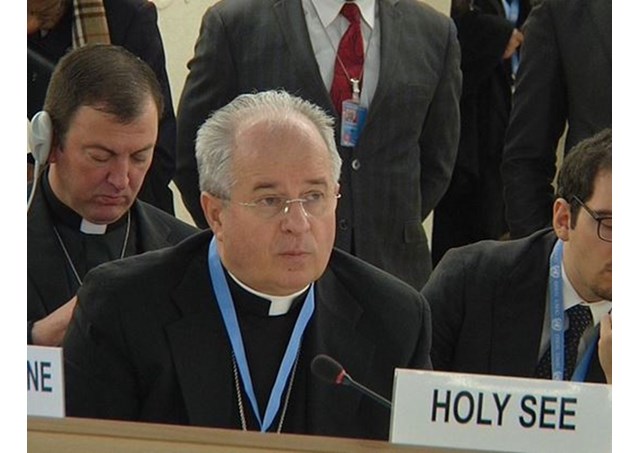
Abp Jurkovič statement on Use of Certain Conventional Weapons

(Vatican Radio) Archbishop Ivan Jurkovič, Permanent Observer of the Holy See to the United Nations and Other International Organizations in Geneva has delivered a statement at the Fifth Review Conference of the Convention on Prohibitions or Restrictions on the Use of Certain Conventional Weapons Which May Be Deemed to Be Excessively Injurious or to Have Indiscriminate Effects (CCW)
Please find the English statement below
12 December 2016
Madam Chairperson,
One of the stark realities of history is that most of the sophisticated and rapid scientific and technological developments have been driven by military logic or application. Rather than being at the service of the greater common good, they have often led to the production of deadly new weapons, used to advance narrow national interests.
While the means and methods of warfare have changed, the suffering and fear they cause have always been the red line of conflicts. Today, the scale of humanitarian deprivation we witness is appalling: in 2015, on average, every minute 24 people were forced to flee their homes due to war and violence (UNHCR, Global Trend on Forced Displacement, 2016). An even more tragic reality is that the public conscience seems to have become less sensitive towards the victims, in what Pope Francis called a “globalization of indifference”.
Madam Chairperson,
Confronted with so many victims of conflicts, there is no room for weak decisions and compromises during this Fifth Review Conference; such is the case obviously for ethical reasons, but also, in the first place, because of the legal obligations undertaken by the States parties to the CCW. In this context, I would like to address three main issues in particular:
1) Incendiary weapons. Since the adoption of the 35-year-old Protocol III, the repeated use of incendiary weapons calls into question the adequacy of this instrument in reducing human suffering. Incendiary weapons can inflict cruel and lasting injuries without distinction between civilians and combatants. They can start uncontrollable blazes that often destroy civilian properties and vital infrastructure.
What steps can we take to remedy this inadequacy? The answer is clear: we must commence work in 2017 in the CCW to provide an honest technical and legal review of the provisions contained in Protocol III. In this regard, the Holy See believes that, besides the fact that the use of any weapon must comply with the rules of International Humanitarian Law, it is the use of incendiary weapons together with the magnitude of their effects on people that should be regulated or prohibited, regardless of the purpose for which the weapons are primarily designed. 2
2) Explosive weapons in populated areas. The tragic experience of conflicts all over the world shows that the use of explosive weapons with wide effects in populated areas has a dramatic and long-term humanitarian impact. Explosive weapons destroy housing and vital infrastructure such as hospitals, schools, water and power supply systems, leaving far too many people trapped in a cycle of violence. In addition, these weapons often leave explosive remnants of war, which can kill and injure civilians for decades after hostilities have ended.
Madam Chairperson,
Some statistics better illustrate this tragic reality: in 2015, when explosive weapons were used in highly populated areas as many as 92% of the people killed or injured were civilians, with children and women being the most affected (OCHA, 2016). With two thirds of the global population projected to be living in urban areas by 2030 (UN Habitat report, 2016), these figures are solid enough to question the “collateral damage” caveat. The number of civilian victims should raise serious moral and legal questions: the CCW has an obligation to face these new realities and to make bold decisions aiming to safeguard civilian infrastructures, which are indispensable to living with dignity.
3) Lethal Autonomous Weapons Systems (LAWS). The Holy See has already presented to the CCW Informal group a position paper and a working paper to express its views and grave concerns about the increasing trend in the dehumanization of warfare. Taking humans “out of the loop” poses significant legal, ethical and humanitarian questions, primarily because of the absence of meaningful human involvement in selecting and attacking targets and the decision over death and life, a heavy responsibility for a human being that involves moral reasoning for which the human person is uniquely suited and accountable.
In this regard, the Holy See appreciates the work recently conducted in the CCW and urges that the recommendations by the Group of Experts be endorsed, leading to the establishment of a Group of Governmental Experts which is the least that the CCW can do. Given the urgency of the matter, it will be crucial to allocate sufficient time and resources to examine this issue and to enter into honest negotiations. In the case of LAWS, the Holy See reiterates its previous and repeated position that prevention and prohibition are the best option.
Madam Chairperson,
International security and peace are best achieved through the promotion of a culture of dialogue and cooperation, not through an arms race. Civilians always bear the highest price of war while the weapons industries profit from it. Until this unfortunate logic is changed, it is incumbent upon us to reduce at least the human suffering caused by armed conflicts. But we, as States parties, must strive for more than that. Our objective should be a world where peace and non-violence are the norm. The CCW can be part of this noble aim if it makes right and timely decisions during this Fifth Review Conference.
Thank you, Madam Chairperson.
| All the contents on this site are copyrighted ©. |


